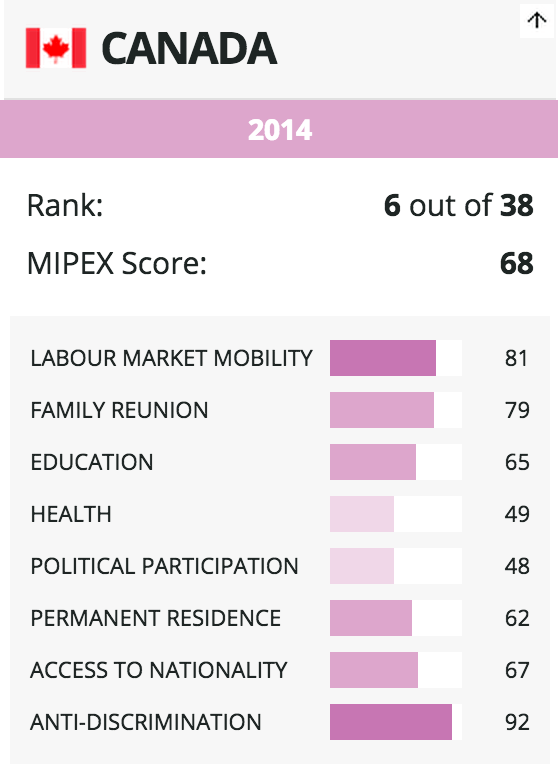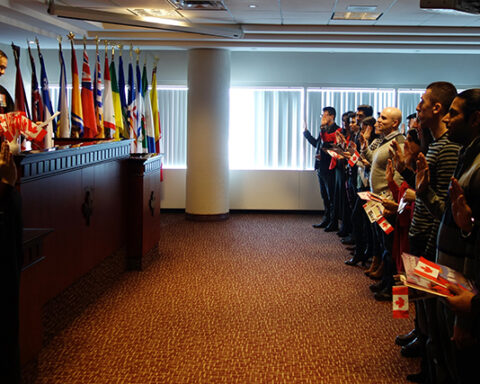Canada is taking a step back on immigration policy, according to the Migrant Integration Policy Index (MIPEX), released yesterday.
Canada scored 68 out of a possible 100 points for 2014, which is a four-point decline from the score of 72 it received in 2011, and dropped Canada out of the top five countries in integrating immigrants. The report examines if policies provide equal rights, opportunity and support for immigrants.
“Canada has undergone several restrictions in recent years that all together sent Canada in the opposite direction,” the report stated. These restrictions include: greater processing times for permanent resident applications, restrictions and documentation burdens to become Canadian citizens and restrictions on reuniting dependent family members.
“Is Canada still a global leader? Certainly . . . but there are worrying changes.” – Thomas Huddleston, Migration Policy Group
 “It is surprising to see Canada go down [in its score]. If Canada continues to go down this path, we may see a continued score decline, like the U.K.,” said Thomas Huddleston, a policy analyst with Migration Policy Group, the independent European think tank, which released the report. “Canada is still a global leader. The general public has some of the world’s most positive views on immigrants.”
“It is surprising to see Canada go down [in its score]. If Canada continues to go down this path, we may see a continued score decline, like the U.K.,” said Thomas Huddleston, a policy analyst with Migration Policy Group, the independent European think tank, which released the report. “Canada is still a global leader. The general public has some of the world’s most positive views on immigrants.”
The Migration Policy Group collaborated with the Ryerson Centre for Immigration and Settlement to gather statistics and information on Canadian policies in eight areas including: labour market mobility, family reunion, access to education, health, political participation, long-term residence, access to nationality and anti-discrimination.
“Is Canada still a global leader? Certainly . . . but there are worrying changes,” said Huddleston. “We find that MIPEX scores very strongly relate to public opinion. The higher the score, the likelier it is that public see immigration as a contribution rather than a threat.”
Labour Market Mobility
Canada scored an 81 on its ability to provide legal residents with the same labour rights as citizens. Indicators include: access to labour market, access to general support and targeted support and workers’ rights.
“Canada is one of the world leaders in this regard,” Huddleston said.
“While on paper immigrant workers have the same rights, there’s a real difference if you’re a temporary foreign worker.” – Ratna Omidvar, Global Diversity Exchange
Although Canada ranks fifth internationally in terms of labour market mobility, there are major discrepancies between policies and the reality on the ground, according to Ratna Omidvar, executive director of the Global Diversity Exchange.
“While on paper immigrant workers have the same rights, there’s a real difference if you’re a temporary foreign worker,” said Omidvar. “There is a real gap between getting the credentials and getting the job. In terms of precarious work, the data shows [people most impacted by this] are immigrants.”
Canada is advised to look at countries including New Zealand and Australia for ideas on how to utilize people with foreign skills, including developing mentorship and coaching programs for newcomers.
Family Reunion
Canada scored a 79 when examining how easily immigrants can reunite with their family members, by bringing them here. The report cited that recent changes have started to undermine the traditional Canadian policies, which welcomed immigrant families.
Sponsorship of parents and grandparents was frozen in 2012 and reopened in 2014, to be judged on criteria of economic value, rather than dependency. This new process relies on applicants to have 30 per cent more financial income. Applicants should also be able to cover their family’s basic living expenses.
Furthermore, fees for this process was deemed high in comparison to other countries and the length requirement to sponsor family members has doubled – from 10 years to 20 years.
“We were surprised to see restrictions,” Huddleston said. “[The federal government] is creating a more select approach so that only people with certain revenues can bring family members.”
Access to Education
Canada scored 65 on its education assessment, which looked at access to education, targeting the needs of newcomers and developing opportunities for this group.
“Canada recognizes the importance of diversity and what immigrant children bring to the classroom. This is where Canada leads the world.” – Thomas Huddleston
The Index also looked at initiatives by the education system to teach students about multiculturalism, modifying curriculum to serve a diverse student body and promoting intercultural and interfaith understanding.
“Canada recognizes the importance of diversity and what immigrant children bring to the classroom. This is where Canada leads the world,” Huddleston said.
Health
On its ability to provide inclusive, accessible and responsive health care to migrants, Canada scored 49, falling behind 17 other countries. The Index stated that health care is an area of weakness in integration policies, with major differences between provinces.
“Canada’s ranking here is not surprising considering Canada’s treatment of refugees’ health,” said Morton Beiser, founding director and senior scientist of the Toronto-based Centre of Excellence for Research on Immigration and Settlement.
The MIPEX report found that policies in Canadian health care were weak in addressing diverse populations and providing interpretation of health services.
In 2012, the federal government made changes to the Interim Federal Health program, taking away access to basic health care from refugee claimants. Eventually it was restored after public pressure and court orders. The government is continuing its appeal of these court orders.
The MIPEX report found that policies in Canadian health care were weak in addressing diverse populations and providing interpretation of health services.
“On Citizenship and Immigration’s website, their advice to immigrants is to get a health card and find a doctor,” said Beiser. “But the website says if their paperwork isn’t done correctly, they might be charged for services, but they can receive free care at a hospital. And then we go around and criticize immigrants for overburdening our hospitals.”
On the positive side, Beiser did point out initiatives around providing health services to immigrant populations, including clinics and doctors who provide pro-bono services. “It’s wonderful, but it’s not sustainable, nor is it just.”
Political Participation
Canada received its lowest score – a 48 – on its ability to integrate newcomers into participating politically. The indicators included: electoral rights, political liberties, consultative bodies and implementation policies.
Canada is one of the few major destinations without voting rights for permanent residents, the report stated, however, it did acknowledge grassroots movements in Canada, which are mobilizing city leaders behind the idea of granting voting rights to newcomers.
Immigrant groups in Canada do not have the opportunity to inform policy through consultations with government, which was a process found in 27 out of the 38 countries examined in the Index. The report said that consultative processes encourages diversity in political discourse and promotes inclusive policymaking.
Long-Term Residence
In Canada, legal residents have the option to apply for permanent residency, which offers security and near-equal rights, although it is a lengthy and expensive process. This landed the nation a score of 62 on the ability of migrant workers, families and refugees to become long-term residents.
Canada’s eligibility is wide and flexible, according to the report, and in line with that of Australia, New Zealand, Spain and Nordic countries.
Access to Nationality
This time around, Canada’s score dropped four points to a 67, when it came to the ease of permanent residents becoming citizens. This drop was caused by changes in 2012 and 2014, which made the process longer and more bureaucratic to obtain citizenship.
The report found that eligibility requirements are overall favourable in Canada, however there are increased restrictions including a delayed wait for naturalization – up to four years from three years – as well as the additions of language proof and a good character requirement.
“Getting citizenship is a longer process, more difficult to obtain and it’s easier to be taken away.” – John Shields, Ryerson University
John Shields, a Ryerson professor and managing editor of the Journal of International Migration and Integration, said these measures have moved Canada in a different direction.
“Getting citizenship is a longer process, more difficult to obtain and it’s easier to be taken away,” he explained. For example, the federal government now has the ability to revoke citizenship from dual citizens if they are deemed to have committed crimes against the state.
Processing fees in obtaining citizenship have increased over six-fold, Shields said, at over $500 for an adult.
“It’s particularly challenging of newcomer families who are working survival jobs.”
Collectively, these measures don’t fare well for Canada when it comes to integrating newcomers.
“We are challenging multicultural values and endangering our score to fall further,” Shields said.
Anti-Discrimination
According to the report, Canada is soaring in this area, ranking highest of all countries with a score of 92. This is thanks to the strongest laws on discrimination in the developed world, the report said.
Many types of discrimination are clearly defined in Canada, as opposed to countries such as New Zealand and Sweden. People in Canada are protected in all areas of public life and federal, provincial and territorial human rights codes provide protection against many types of discrimination.
Despite Canada’s number one spot, Omidvar said there are still challenges which the ranking might not reflect.
“There’s a big difference between what we say and what we do,” she explained. “The presence of a foreign-sounding name impacts your chances of getting [a job] interview.”
While the report mentioned the government’s federal level employment equity programs as a success, Omidvar suggested stronger policy to regulate workplaces so that they better reflect demographics around them should be implemented.




